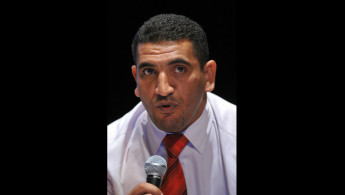Tensions rise in Algeria following arrest of prominent opposition figure Karim Tabou
Security forces arrested Tabou, the founder of the Social and Democratic Union party, without a warrant or any explanation outside his house in the Douera suburb of Algiers.
Lawyer and rights activist Mustapha Bouchachi said in a statement that Tabou’s wife told him that plain clothed security officers came to their house at 1pm and arrested Karim, telling her he would be released after two hours.
Bouchachi added Tabou had not yet been released and the reasons for his arrest remain unknown.
A statement by the Social and Democratic Union party, which Tabou founded said the activist "was arrested by the police without any explanation or reason given."
Tabou took part in a conference on Monday which called for the rejection of the upcoming presidential elections.
Observers believe the reason for his arrest was his vocal criticism of the military and the army’s chief of staff, Ahmed Gaid Salah.
The head of the Rally for Culture and Democracy (RCD), Mohsen Belabbes, said Tabou was being "held hostage" by "mercenaries" without any legal support, demanding Tabou's immediate release along with all those arrested by the authorities.
Thousands of Algerians have took to the streets on Friday to protest Salah’s call for swift presidential elections.
Algeria has been without an elected president since protesters, helped by the army chief, forced Abdelaziz Bouteflika to resign in early April.
Nationwide demonstrations started 22 February to protest plans by Bouteflika, who was rarely seen in public since a 2013 stroke, to seek a fifth mandate. His administration was mired in corruption and top figures have since been imprisoned, along with leading industrialists.
Protesters now seek a democratic government and want a say in how to achieve that goal, with many of the belief that swiftly held elections will reinstate the old, undemocratic system.





 Follow the Middle East's top stories in English at The New Arab on Google News
Follow the Middle East's top stories in English at The New Arab on Google News
![Netanyahu furiously denounced the ICC [Getty]](/sites/default/files/styles/image_330x185/public/2024-11/GettyImages-2169352575.jpg?h=199d8c1f&itok=-vRiruf5)
![Both Hamas and the Palestinian Authority welcomed the ICC arrest warrants [Getty]](/sites/default/files/styles/image_330x185/public/2024-11/GettyImages-2178351173.jpg?h=199d8c1f&itok=TV858iVg)
